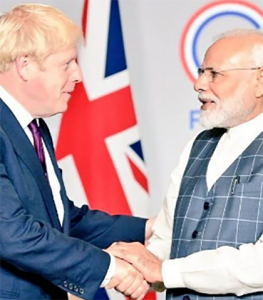UK and India strike historic migration deal
The UK and India have signed a new migration agreement to allow freer movement of young people between the two countries as well as measures to tackle illegal immigration.
“The historic agreement delivers on the UK government’s fair but firm New Plan for Immigration – attracting the best and brightest and supporting people coming to the UK through legal routes, while stopping the abuse of the system and speeding up the removal of those who have no right to be in the UK,” Britain’s Home Office said in a statement.
 The deal will see a billion pounds ($A1.79 billion) of private-sector investment and commits the two nations to seek a free trade deal as Prime Minister Boris Johnson hailed a new era in bilateral relations.
The deal will see a billion pounds ($A1.79 billion) of private-sector investment and commits the two nations to seek a free trade deal as Prime Minister Boris Johnson hailed a new era in bilateral relations.
Mr Johnson held a virtual meeting with Indian Prime Minister Narendra Modi, replacing a trade visit he had to cancel last month due to surging COVID-19 cases in India.
Britain, the world’s fifth largest economy, is seeking closer ties with India, the sixth biggest, as a key pillar of its post-Brexit push to seek trade and influence in the Indo-Pacific region and address growing Chinese dominance.
“The agreements we have made today mark the beginning of a new era in the UK-India relationship,” Mr Johnson said in a statement.
“The UK and India share many fundamental values. There is a living bridge uniting the people of our countries,” he said.
India won independence from former colonial power Britain in 1947 and the two countries retain deep ties, with more than a million Britons claiming Indian origin.
The migration deal also seeks to address friction between the two allies, in which Britain says there are too many Indians living illegally in Britain, and India says tens of thousands who come to Britain to study are denied job opportunities.
It will provide enhanced employment prospects for 3,000 young Indian professionals annually, in return for India agreeing to take back any of its citizens who are living illegally in the UK.
The two countries also announced agreements on climate change, technology and pharmaceuticals.
The announcement came alongside an “Enhanced Trade Partnership” agreement, with both countries committing to begin full trade talks in the northern autumn with the ambition to double existing bilateral trade by 2030.
The partnership deal will lift export barriers on goods ranging from British apples to medical devices, and open up India’s legal services sector to UK firms. In return Britain agreed to improve access to its fisheries and nursing sectors.












